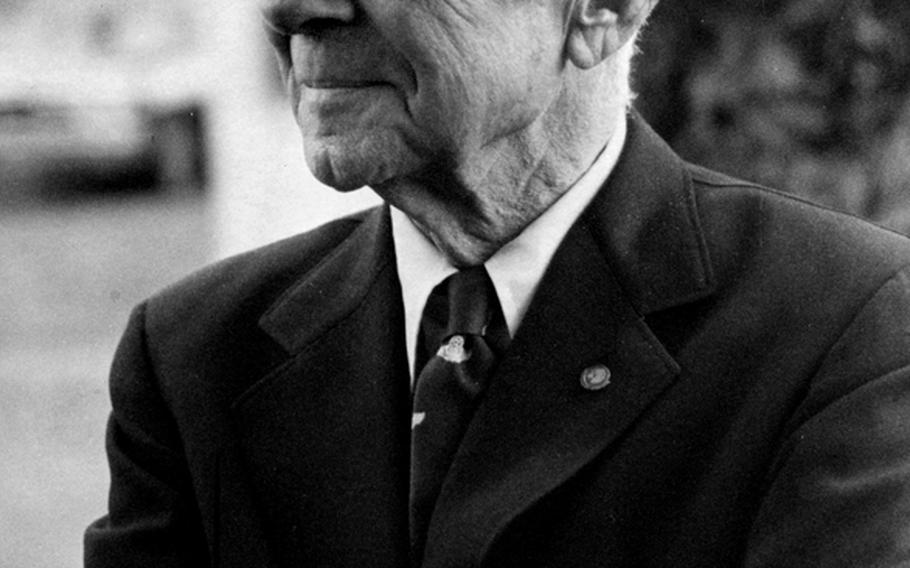
World War II hero James H. Doolittle, during a 1978 visit to Yokota Air Base. (Hal Drake/Stars and Stripes)
YOKOTA AB, Japan — Spry and alert at 82, Gen. James H. Doolittle Saturday refused to dwell on his historic 1942 raid on Tokyo and instead urged President Carter to adopt the B-1 bomber and be cautious about making any disarmament agreement with the Soviets.
In an interview, Doolittle said there is only one time of year he likes to recall the daring sortie that took 16 American bombers off the carrier Hornet for a raid on the Japanese capital and five other cities — when he and the other 50 men left of the original 80 raiders gather for an annual reunion.
"I don't believe in dwelling too much on the past," Doolittle said. "I'm delighted that we and the Japanese would be allies if another war were thrust upon us."
Doolittle, long retired from the U.S. Air Force and now an insurance executive with Mutual of Omaha, spoke his mind sharply about other things — among them his hopes that Carter will change his mind about junking the B-1 in favor of the aging B-52 bomber.
"The B-1, or a similar plane if we know how to do it a little better, is a very important part of our strategic posture and should, and I am quite sure will, finally come into our inventory."
Doolittle said he believes Carter will reconsider because the Soviets have the high-performance Backfire bomber and are reportedly building another plane similar to the B-1.
The general added that the controversial neutron bomb should be added to the American arsenal "with all possible expedition," plainly stating that he doesn't trust the Russians to keep any disarmament agreement.
"I think that disarmament is a very fine concept," Doolittle said, "provided we keep in mind that anything we do must be mutually advantageous to the Russians — and when it is no longer advantageous to them, to be realistic enough to know that they will abandon their agreement."
Doolittle said he has read a lot of Nikolai Lenin and that the Communist Party prophet wrote that capitalism is incorrigibly evil and any tactic must be employed to destroy it and install a worldwide communist government.
"1 feel that the Russians believe sincerely that there can be a peaceful world only if there is but one ideology," Doolittle said. "That ideology, they hope, will be communism. And they believe in the law of expediency, which says that the end justifies the means. And that anything is right — lying, stealing, killing, as long as it advances your end. So I think we must go into any deal with the Soviets with the understanding that they will abide with the deal only as long as it is advantageous to them."
He said it would be "suicide" for the United States to disarm unilaterally and expect the Russians, in a sudden seizure of morality, to do the same.
Returning to Japan for his ninth visit, including his flashing glimpse of Tokyo on April 18, 1942, Doolittle attended a formal dinner in his honor at the Yokota Officers' Club and also stopped by the NCO Club. He was to leave Sunday for a one-day stopover at Osan AB in South Korea.
Asked if he thought there could ever be insurance against war, Doolittle replied: "This is a hard question for an insurance man to answer. But I would answer it, perhaps, by saying that I believe the best insurance against war would be to become and remain militarily strong ... I feel that we must be militarily strong in order to discourage adventurism, possible nuclear blackmail and ... possibly, war."
Doolittle's famous raid, which took him from lieutenant colonel to lieutenant general and won him the Medal of Honor, was launched to deflate buoyant Japanese confidence and give a lift to Americans, discouraged by the fall of Bataan and the last stand on Corregidor.
Among the guests at the officers1 club was Saburo Sakai, the Japanese ace who shot down 65 Allied planes and almost dropped one carrying Lt. Cmdr. Lyndon B. Johnson.
"Times change," Doolittle smiled.